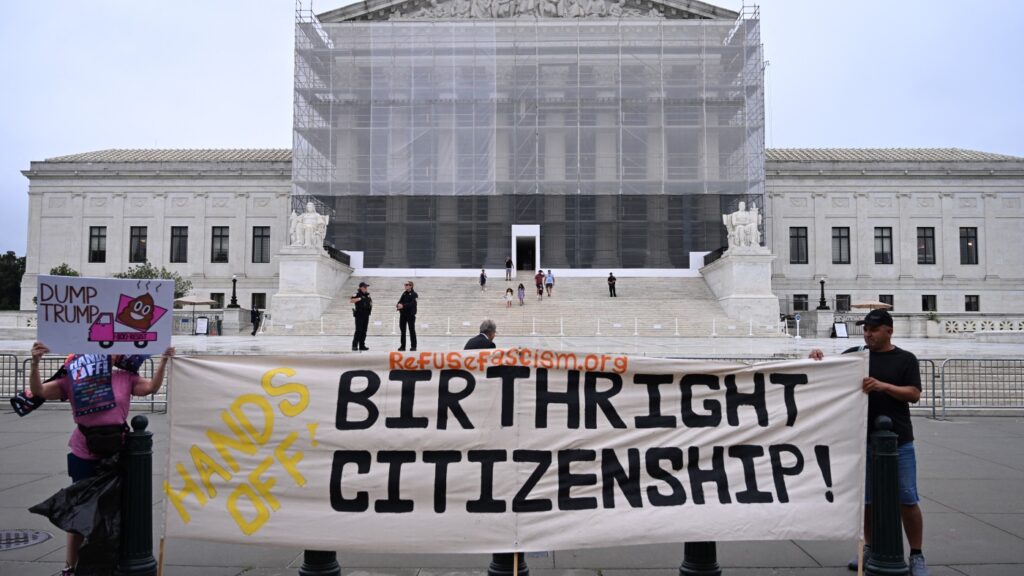
Demonstrators holds up an anti-Trump sign outside the US Supreme Court in Washington, DC, on June 27, 2025. The Supreme Court is to issue its final rulings on Friday ahead of its summer break, including cases involving birthright citenzenship, porn site age verification, students and LGBTQ-themed content, and voting rights. US President Donald Trump said Friday he can now push through a raft of controversial policies after the Supreme Court handed him a "giant win" by curbing the ability of lone judges to block his powers nationwide. In a 6-3 ruling stemming from Trump's bid to end birthright citizenship, the court said nationwide injunctions issued by individual district court judges likely exceed their authority. (Photo by Alex WROBLEWSKI / AFP) (Photo by ALEX WROBLEWSKI/AFP via Getty Images)
After the Supreme Court issued a ruling that limits the ability of federal judges to issue universal injunctions, immigrant rights groups are pivoting to a new legal strategy. The court’s decision did not directly address the legality of President Trump’s executive order on birthright citizenship, prompting these groups to file a national class action lawsuit. This lawsuit represents a significant shift in tactics as advocates seek to protect the citizenship rights of children born in the United States to undocumented immigrants.
The lawsuit was filed by two immigrant rights organizations, whose members include individuals without legal status in the U.S. who “have had or will have children born in the United States after February 19, 2025,” according to court documents. William Powell, senior counsel at the Institute for Constitutional Advocacy and Protection at Georgetown Law, explained that the class action approach aims to secure comprehensive relief for all affected by the executive order.
Legal Maneuvering and Strategic Shifts
The strategic shift required a series of legal maneuvers, including three court filings: one to add class allegations to the initial complaint, another to move for class certification, and a third requesting a district court in Maryland to issue a temporary restraining order or preliminary injunction. These actions were taken swiftly, with the amended complaint filed just two hours after the Supreme Court’s ruling.
The amended complaint argues that Trump’s executive order, if upheld, would jeopardize the citizenship status of thousands of children nationwide. “The Executive Order threatens these newborns’ identity as United States citizens and interferes with their enjoyment of the full privileges, rights, and benefits that come with U.S. citizenship,” the complaint reads.
Historical Context and Constitutional Implications
Birthright citizenship, a concept rooted in the English common law principle of jus soli or “right of the soil,” has been a cornerstone of U.S. citizenship law since the 14th Amendment was ratified in the 1860s. The amendment clearly states, “All persons born or naturalized in the United States, and subject to the jurisdiction thereof, are citizens of the United States.”
Wendy Weiser, vice president for democracy at the Brennan Center for Justice at NYU Law School, emphasized the enduring constitutional foundation of birthright citizenship. “Any executive order purporting to limit birthright citizenship is just as unconstitutional today as it was yesterday,” she told NPR.
Supreme Court’s Decision and Its Implications
The Supreme Court’s decision to limit universal injunctions has raised concerns among immigrant rights advocates. Keren Zwick, director of litigation at the National Immigrant Justice Center, noted that nationwide injunctions have been crucial in preventing illegal and unconstitutional conduct. “The decision to limit such injunctions opens a pathway for the president to break the law at will,” Zwick stated.
While the Supreme Court did not address the legality of Trump’s executive order, the ruling has significant implications for the ongoing legal battle over birthright citizenship. The majority opinion, penned by Justice Amy Coney Barrett, distinguishes between “complete relief” for individual plaintiffs and “universal relief” that would extend protections to all similarly situated individuals.
“Here, prohibiting enforcement of the Executive Order against the child of an individual pregnant plaintiff will give that plaintiff complete relief: Her child will not be denied citizenship,” Barrett wrote. “Extending the injunction to cover all other similarly situated individuals would not render her relief any more complete.”
Future Legal Battles and Political Reactions
The Supreme Court’s ruling has set a 30-day timeframe for the policy outlined in Trump’s executive order to take effect, adding urgency to the legal efforts of immigrant rights groups. Attorney General Pam Bondi, speaking at the White House, declined to comment on how the order might be implemented, citing pending litigation.
As the legal battle continues, Powell remains optimistic that the Supreme Court will ultimately uphold the constitutional guarantee of birthright citizenship. “The executive order flagrantly violates the 14th Amendment citizenship clause and Section 1401a of the Immigration and Nationality Act,” Powell asserted, “both of which guarantee birthright citizenship to nearly all children born in the United States, with only narrow exceptions.”
The ongoing dispute over birthright citizenship is likely to have far-reaching implications for U.S. immigration policy and the separation of powers. As the legal and political landscape continues to evolve, the nation watches closely to see how these foundational issues will be resolved.







